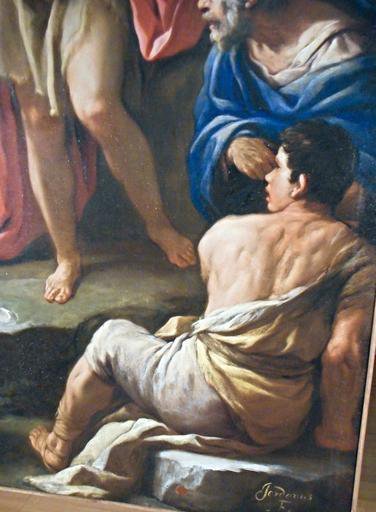Thoughts for the Day
Friday, 2nd February 2024: The death of John the Baptist
Herod Antipas Herod the Great John the Baptist Jesus Mark 6
Reading : Verses from Mark, Chapter 6

King Herod heard of it, for Jesus’ name had become known. Some were saying, ‘John the baptizer has been raised from the dead; and for this reason these powers are at work in him.’ But others said, ‘It is Elijah.’ And others said, ‘It is a prophet, like one of the prophets of old.’ But when Herod heard of it, he said, ‘John, whom I beheaded, has been raised.’
For Herod himself had sent men who arrested John, bound him, and put him in prison on account of Herodias, his brother Philip’s wife, because Herod had married her. For John had been telling Herod, ‘It is not lawful for you to have your brother’s wife.’ And Herodias had a grudge against him, and wanted to kill him. But she could not, for Herod feared John, knowing that he was a righteous and holy man, and he protected him. When he heard him, he was greatly perplexed; and yet he liked to listen to him. But an opportunity came when Herod on his birthday gave a banquet for his courtiers and officers and for the leaders of Galilee. When his daughter Herodias came in and danced, she pleased Herod and his guests; and the king said to the girl, ‘Ask me for whatever you wish, and I will give it.’ And he solemnly swore to her, ‘Whatever you ask me, I will give you, even half of my kingdom.’ She went out and said to her mother, ‘What should I ask for?’ She replied, ‘The head of John the baptizer.’ Immediately she rushed back to the king and requested, ‘I want you to give me at once the head of John the Baptist on a platter.’ The king was deeply grieved; yet out of regard for his oaths and for the guests, he did not want to refuse her. Immediately the king sent a soldier of the guard with orders to bring John’s head. He went and beheaded him in the prison, brought his head on a platter, and gave it to the girl. Then the girl gave it to her mother. When his disciples heard about it, they came and took his body, and laid it in a tomb.
(Lectionary, New Revised Standard Version)
Thoughts
Because of our reverence for Jesus, it is difficult to appreciate how much John the Baptist was revered by people. But John had gathered thousands and baptized them in the Jordan as a sign of their repentance, which was a strange thing since only gentiles who embraced Judaism were normally baptised. J esus, was a relatively new phenomena at this time, so the gossips wondered if John had come back to life, for Herod had executed him at the request of his new wife and her daughter.
If this seems odd, it barely begins to explain the family of Herod the Great who married five women, and had seven children by them, three of whom he murdered. Then there is Herodias who who was the daughter of his half-brother, and who first married Herod Philip (and had a daughter, Salome) and then Herod Antipas, and Salome who married another son of Herod the Great, Philip the Tetrarch. Confused? Suffice it to say these men held their positions at the will of the Roman Emperor, and their job was to keep the peace and return taxes to Rome! Men like John the Baptist were ultimately seen as rabble-rousers to be removed.
So we have the dreadful end of John the Baptist, a man greater than anyone on earth according to Jesus, and a man who knew that he came to prepare the way for the Messiah (see John 3.27-30), and lastly a man who broke a 400+ year silence. For God had once again appointed a prophet to speak to His people.
Prayer
Heavenly Father,
we thank you for Elizabeth and Zechariah,
and for their son, John the Baptist,
for their faithfulness in listening to You,
and their courage in taking Your message
to the world.
May we 'tune in to You' each day,
learning not just to ask for something
but to listen to Your voice as it
whispers words to us,
and may we have the courage to carry them out.
Amen.
If you would like to explore further why John the Baptist was great, look at this article:
Or listen to this by Chet Valley Churches: